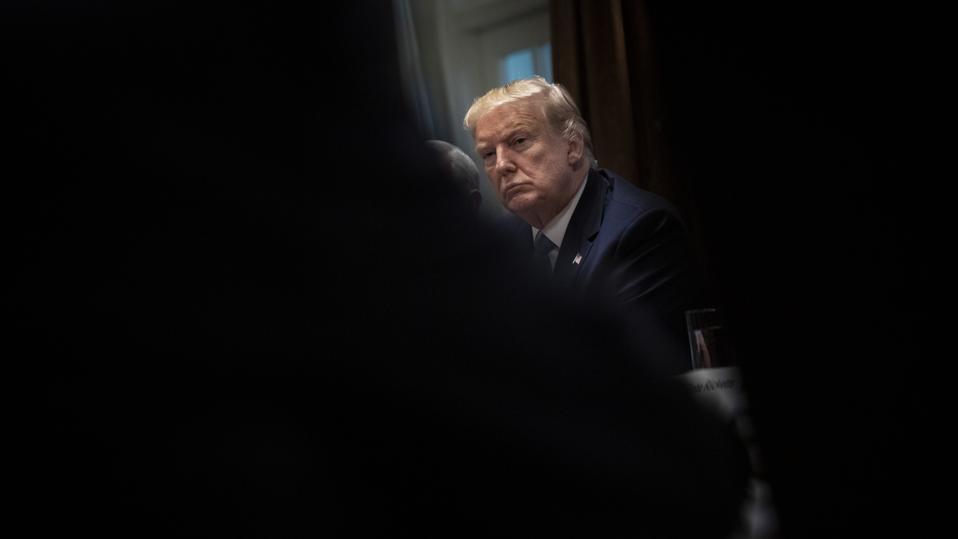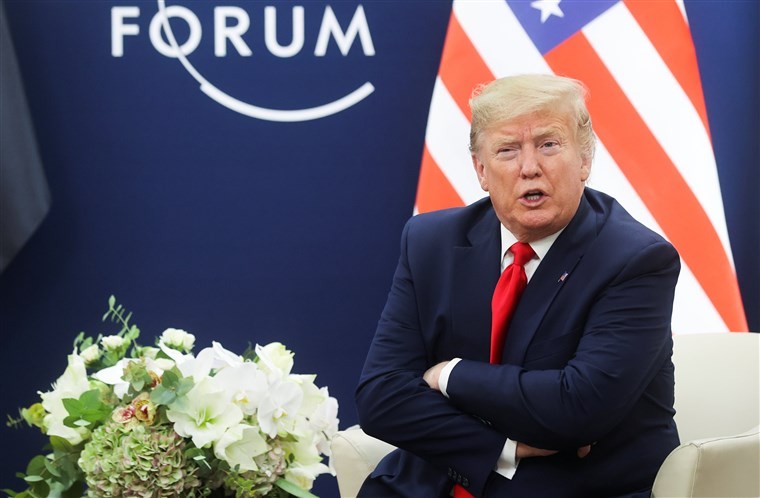President Trump could be heard saying that using marijuana makes people “lose IQ points” in a secretly recorded conversation released on Saturday.
“In Colorado they have more accidents,” the president said in the clip captured by Lev Parnas, an associate of Trump attorney Rudolph Giuliani, who is at the center of the Ukraine scandal that led to the president’s impeachment. “It does cause an IQ problem.”

GETTY IMAGES
Parnas first broached the topic of cannabis by asking Trump about state-legal marijuana businesses’ lack of access to banking services.
“Cannabis, look, you’re talking about marijuana, right?” the president replied. “You can’t do banking there?”
“That’s the biggest problem, because none of the banks accept the money,” Parnas explained.
Trump then said that the issue is “all working out. That whole thing is working out.”
“I don’t know if that’s a good thing or a bad thing,” he added.
The surreptitiously captured video of the April 2018 dinner conversation was released by Parnas’s attorney Joseph Bondy, who separately is a lead attorney in a lawsuit challenging marijuana’s restrictive status under federal law.
Trump has previously voiced support for allowing states to set their own cannabis policies without federal interference.
“We’re going to see what’s going on. It’s a very big subject and right now we are allowing states to make that decision,” Trump said last year. “A lot of states are making that decision, but we’re allowing states to make that decision.”
Additionally, he told the lead GOP sponsor of legislation to protect legal cannabis states, Sen. Cory Gardner (R-CO), that he opposed a directive from then-Attorney General Jeff Sessions to rescind Obama-era guidance directing federal prosecutors to generally respect state marijuana laws.
“It was very clear to me at that point that there was a disagreement between the president and the attorney general on this,” Gardner said last year after speaking with Trump.
The president also signed wide-ranging agriculture spending legislation in 2018 that included a provision legalizing hemp and its derivatives such as CBD.
As Trump met with public health officials and vaping industry executives last November, he suggested that drug prohibition doesn’t work, arguing that people will continue to seek out the illicit products but they would endanger public health because they aren’t regulated.
“When you watch prohibition, when you look at the alcohol, you look at cigarettes, you look at it all, if you don’t give it to them, it’s going to come here illegally,” he said. “That’s the one problem I can’t seem to forget.”
When it comes to banking access, the Democratic-controlled House of Representatives passed a bill last year to protect financial institutions that work with legal marijuana businesses from being punished by federal regulators. But the legislation has so far languished in the Republican-controlled Senate, with the chairman of the chamber’s Banking Committee floating a number of potential changes last month, including a two percent THC potency cap on marijuana businesses in order to qualify for financial services access.
Trump could also be heard in the newly released recording asking a number of questions, such as, “Do you think the whole marijuana thing is a good thing?” and, “But it’s actually good for opioids?”
One dinner attendee replied to the latter query by saying that cannabis is a “better alternative” to prescription painkillers, while another said that “alcohol does much more damage” than marijuana.
Parnas argued that embracing marijuana reform would be a good move for the president ahead of the 2018 midterms because it has strong appeal to young voters at a time when more and more states are enacting legalization policies.
“It’s so far out you’re not going to stop it,” he said. “I think you need to be ahead of it.”
Parnas also suggested that Trump set up a “bipartisan committee” with “no politicians” to examine the issue and make recommendations to the president.
Trump did not respond directly to the suggestion.
The president’s claim that using marijuana causes people lose IQ points is contradicted by the National Institute on Drug Abuse (NIDA).
“[R]ecent results from two prospective longitudinal twin studies did not support a causal relationship between marijuana use and IQ loss,” the federal agency says.
Research has shown that people who use cannabis can see declines in verbal ability and general knowledge but that “those who would use in the future already had lower scores on these measures than those who would not use in the future, and no predictable difference was found between twins when one used marijuana and one did not.”
“This suggests that observed IQ declines, at least across adolescence, may be caused by shared familial factors (e.g., genetics, family environment), not by marijuana use itself,” NIDA concluded.
FORBES

